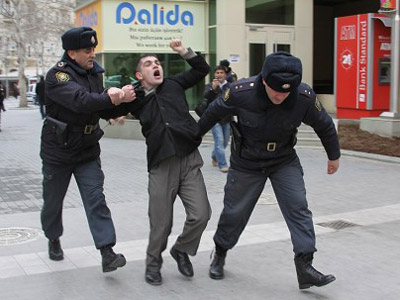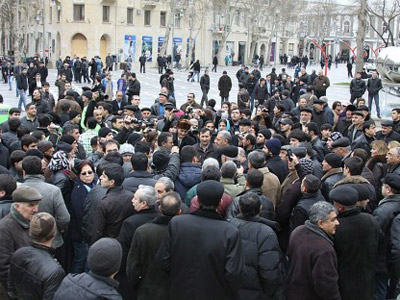It all started on Facebook when the group “March 11 Great People’s Day” appeared on the social networking site, calling for anti-government protests to take place across the country on that day, writes Maharram Zeynalov on newcaucasus.com (original in Russian).
More than 50,000 youth were invited to take part in the rally. The vast majority on Facebook did not support the organizers.
Despite the arrests of organizers, young people in different parts of Baku held demonstrations, though it’s unlikely they could be called mass events.
According to eyewitnesses, youth gathered in groups and shouted “Resign!” and “Eggs!” — apparently protesting both authoritarianism and monopolies (it recently became known that the cost of eggs in Azerbaijan today is the highest in Europe).
During the protests, according to reports, police detained a total of about 40 people (Reuters, citing Azerbaijan’s Interior Ministry, notes 43 to be exact). In addition, several journalists were injured, including RFE/RL photojournalist Abbas Atilaya. “He [the person who beat me] was a police captain. He beat me, even though he saw the inscription ‘press’ on my jacket,” he said. According to Atilaya, several men in civilian clothes helped him get rid of the police officer, forced the law enforcement employee to apologize, then added, “We respect Europe very much!”
The next protest, this time organized by opposition party Musavat, took place on Mar. 12 in the heart of the city — at Fountain Square. This time, according to witnesses, there were about 500 people. Within half an hour, the rally was broken up and 10 people were detained.
“The attempt at mass rallies failed simply because there is not the national will of universal compassion toward the brotherly countries of North Africa,” said blogger Vugar Safarov. “The fear of being beaten by police or losing their jobs is what keeps a substantial portion of the population from participating in rallies.”
Azerbaijan Country Director for the Institute for War and Peace Reporting Shahin Rzayev considers that the small numbers of youth that came out on the street on Mar. 11 “didn’t know themselves what they want” and didn’t have a “clear, central idea around which to rally supporters.”
“Another factor that reduces the likelihood of the Egypt scenario being repeated in Azerbaijan is the lack of the common tradition of Friday prayers, since the Friday prayer when thousands of believers gather together largely determined the developments in both Egypt and other countries,” said Rzayev.
Furthermore, according to Rzayev, the culture of social networks is not as well developed in Azerbaijan. “In general, what happened on Mar. 11 could be called another good idea compromised.”
Photos: Turxan Qarışqa’s blog
 Epress.am News from Armenia
Epress.am News from Armenia

